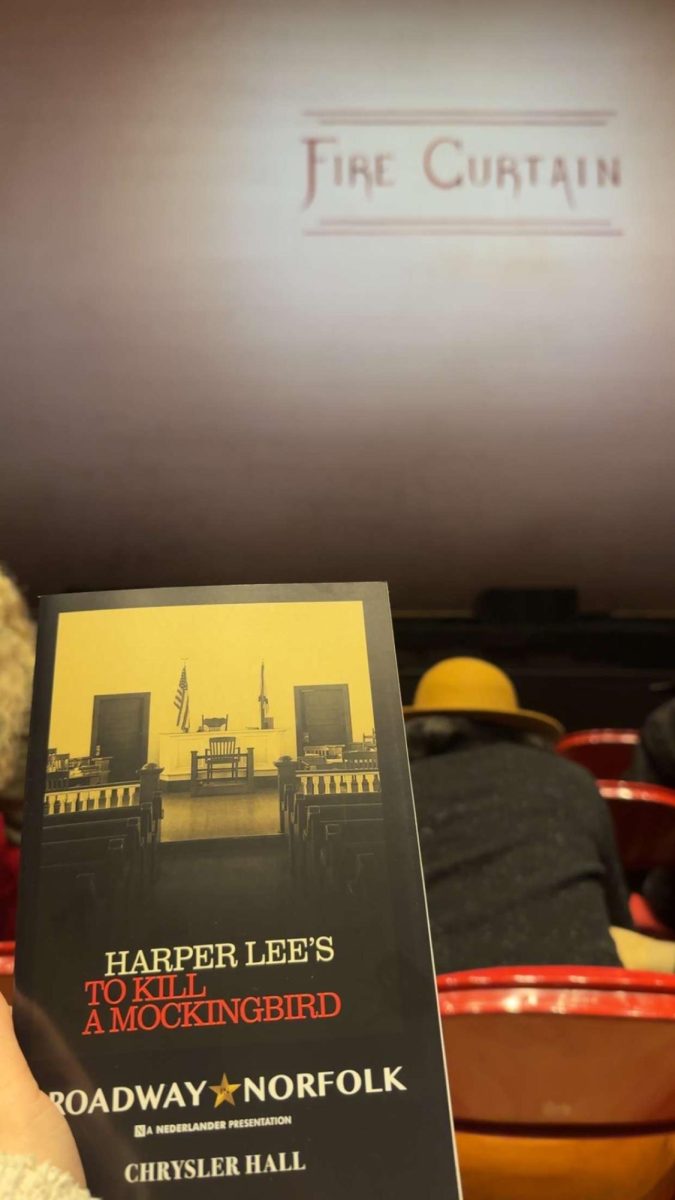Everyone knows (or at least should know) the serious and harrowing story of To Kill a Mockingbird by Harper Lee. An unjust trial, a black man trying to survive, a lawyer attempting to make a difference, and three young children wanting to discover the truth of the world. Since its inception in 1960, To Kill a Mockingbird is a novel that has been read for generations, taught in countless middle school and high schools, and of course there is the Oscar award winning movie in 1962 starring Gregory Peck as Atticus Finch. However, in 2018 playwright Aaron Sorkin decided to adapt the beloved material into a play that premiered on Broadway and eventually went on tour for the past few years where it eventually stopped in Norfolk, VA at Chrysler Hall from January 30 to February 4 this year. I had the opportunity to see the play on February 3 and it absolutely did not disappoint.
Starring Richard Thomas as Atticus Finch (who many might know as John-Boy in the 70s tv show The Waltons), To Kill a Mockingbird takes place in the fictional town of Maycomb, Alabama in 1934 and centers around a black man named Tom Robinson (played by Yaegel T. Welch) who is on trial for a rape that he did not commit in front of an all white jury and the odds are definitely stacked against him. While the plot stays the same, the play To Kill a Mockingbird is its own entity in comparison to the book and movie. The play is narrated by the three children; Scout and Jem who are siblings in addition to their new friend Dill who is visiting for the summer. One of the biggest differences between the play compared to the book and movie is that these three characters are played by actual adults but are still dressed in playful, young clothing. This decision may seem unrealistic at first but the demands of the play and being on tour in general can be difficult and in context of the show, the casting choice makes a lot of sense. Scout is played by Scout Backus, Jem by Justin Marks, and Dill by Steven Lee Johnson. However, the narration jumps back and forth from when Scout and the others were children experiencing the trial to them in the future as adults, looking back on their childhood. Scenes are presented in a nonlinear style with a main focus on the trial room and though this could be seen as confusing at first, it offers a refreshing and well-paced sequence that keeps the audience in suspense even though many people still know the basis of the story. The indirect timeline also allows for contrasting scenes and different characters to be pitted right up against each other which further emphasizes the themes of racial injustice, innocence, and morality of humankind that are present and explored within the play.
The character of Atticus Finch is fascinating in this play in that his interpretation is more naive and imperfect compared to the book and movie. His belief that everyone should be treated with respect, regardless of their actions, is considered foolish by some characters such as his servant Calpurnia. Furthermore, he sometimes fails to understand the prejudices that Calpurnia and Tom Robinson face out of pure ignorance. However, he eventually recognizes this and tries to acknowledge his mistakes. This change ultimately makes for a more realistic portrayal of Atticus and illustrates how no character is entirely right in their beliefs since the issues are much deeper than what they seem on the surface.
One of the greatest achievements and also one of the biggest surprises is the play’s use of humor. Despite its difficult subject matter, this play has some hilarious moments through characters such as the sarcastic Calpurnia and her close relationship with Atticus and the playful, honest character of Dill just to name a few. All the characters have scenes full of witty banter which had the audience roaring in laughter. This was something I was not expecting at all going into the theater considering the fact that the book is always treated with utmost respect and seriousness. However, it was obvious after the first act that this play requires levity and humor in order to balance out the horror and devastation that also occurs within the plot. No one wants to sit through a two and a half hour play and cry their eyes out watching scene after scene of depressing moments.
On the other hand though, the emotional scenes are absolutely incredible and the actors nailed the many powerful and often heartbreaking monologues that are given in the trial room. One standout performance was Yaegel T. Welch as Tom Robinson whose testimony will be etched in my brain and memory forever. His portrayal of Tom exhibits the pure kindness of the character from his respect towards everyone around him, regardless of mistreatment to the determination he has for his family and his future. His endless optimism along with Atticus’s only adds to the devastation that the audience feels when he is finally convicted of raping Mayella Ewell. Yaegel T. Welch is a testament to how engaged actors become when performing a scene because during his testimony, I could see his tears and runny nose from the fifth row which only made his helpless pleading and innocence that more realistic and heartbreaking. In that specific scene, it was obvious that Welch was fully embodying everything that Tom Robinson was feeling in that moment, as did all the characters whenever they spoke on stage.
There is a sense of foreboding since most audience members know what is going to be the result of Tom Robinson’s trial and yet there was still shock and not a single dry eye in the audience once each cast member declared him as guilty in Act II. All I could hear were people sniffing around me and I personally started crying during that scene and could not fully stop until the show ended. Though the story takes place in the 1930s, the issues presented are still incredibly important and this play serves as a reminder that though America has come a long way, there is still so much work to be done when it comes to breaking down racial barriers and accepting others of a different background.
To Kill a Mockingbird is a story that will always be life changing and worth telling to anyone. It’s more relevant now than ever since it is a book that is being challenged in various public schools (looking at you Florida) and racial prejudice sadly still occurs all over the country. Though To Kill a Mockingbird is no longer in residence at Chrysler Hall, it will be touring in Richmond at the Altria Theater from February 27 to March 3. If you ever get the opportunity to see this play, I highly recommend it because it will completely change your outlook on life and remind you of the importance of accepting others no matter what differences.


